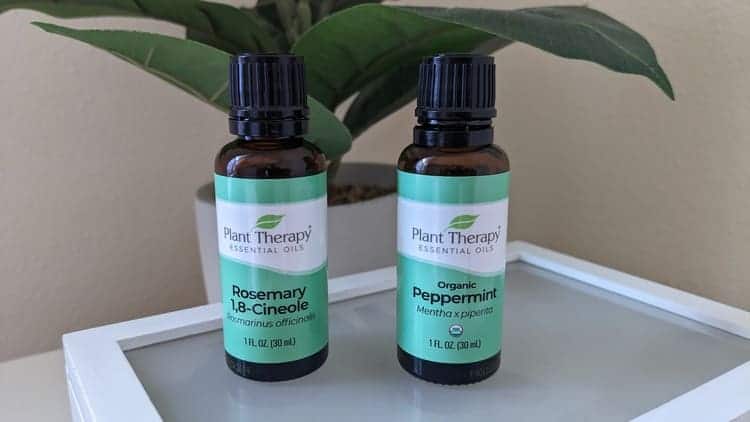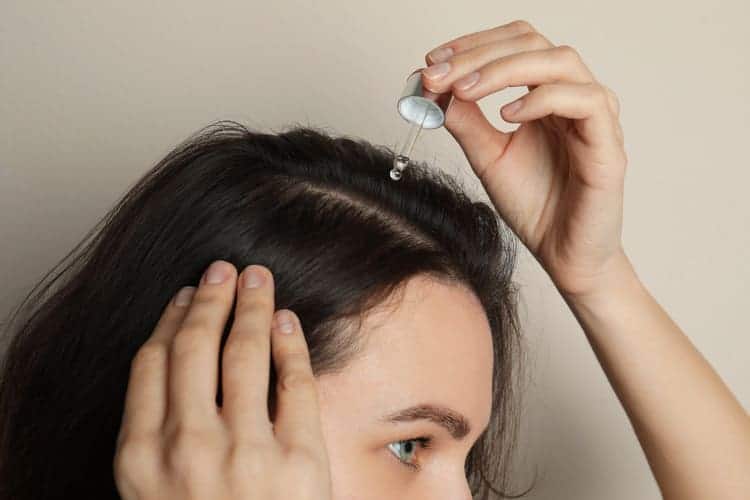
Whether you’re experiencing hair loss, thinning, or you dream of Rapunzel-like hair, you’ve probably heard that essential oils may help. In particular, rosemary and peppermint oil.
But when comparing rosemary vs peppermint oil for hair growth, is one better than the other?
Well, in this article we’re going to look at the research behind both oils and dive into whether they’re worth your time.
But before we get into that a quick note: unexpected hair loss and thinning usually involve other factors like stress, hormonal imbalance and nutritional deficiencies. While topical remedies may help, it’s a good idea work with a healthcare provider who can run the appropriate tests to ensure that you’re addressing the root cause(s) holistically.
NOTE: This article contains some affiliate links and I earn a commission (at no additional cost to you) if you use them to make a purchase.
| Benefits | Rosemary Oil | Peppermint Oil |
|---|---|---|
| Stimulates Hair Follicles | Yes | Yes |
| Improves Blood Circulation | Yes | Yes |
| Alleviates Scalp Inflammation and Irritation | Yes | Yes |
| May Help Androgenetic Alopecia | Yes | No |
| May Improve Alopecia Areata | Yes | No |
BENEFITS OF ROSEMARY OIL FOR HAIR GROWTH
1. Enhances blood flow to the scalp
A comprehensive review of studies on rosemary oil suggests that the oil can enhance “microcapillary perfusion” (source).
In essence, rosemary oil improves blood flow through the blood vessels that nourish the scalp. Since blood transports nutrients and oxygen, this is probably a primary way rosemary oil stimulates hair follicles.
2. May help with alopecia areata
Research suggests that rosemary oil may benefit people suffering from alopecia areata (an autoimmune condition that results in hair loss).
This is based on a small study with 86 alopecia areata who saw improvements as a result of doing scalp massages with a blend of four essential oils: rosemary, lavender, thyme, and cedarwood (source).
Of course, since this study used four oils, it’s hard to say if there was a synergistic effect between all the oils or if one oil had the strongest influence.
3. Alleviates scalp inflammation
Rosemary essential oil has anti-inflammatory and antimicrobial properties.
As a result, it is often used as a natural remedy for dandruff, itchiness and other inflammatory scalp issues.
4. May improve androgenetic alopecia
If you’ve never heard of androgenetic alopecia, it’s a hair loss condition triggered by androgens (male hormones).
According to one study done involving 100 androgenetic alopecia patients, rosemary oil may be just as effective as minoxidil (the primary ingredient in products like Rogaine).
In that study, the participants were divided into two groups:
- One group used 2% minoxidil.
- The other group used a 1% rosemary oil dilution.
After three months, neither group experienced significant hair growth.
However, at six months (1, 2):
- Both groups had more noticeable hair growth and less hair loss.
- The rosemary oil group reported fewer side effects, including a lack of the itchiness (a side effect that tends to occur with minoxidil use).
BENEFITS OF PEPPERMINT OIL FOR HAIR GROWTH
1. Stimulates Hair Follicles
A 2014 study demonstrated that peppermint oil significantly increased hair growth in mice when compared to other treatments like saline, jojoba oil and minoxidil (source).
Most notably, the study found that peppermint oil increased: :
- the quantity of hair follicles.
- the depth of hair follicles.
2. Enhances Blood Circulation
Blood circulation is essential for healthy hair growth because blood supplies oxygen and nutrients to the scalp.
Peppermint oil happens to be a vasodilator, which means it helps widen blood vessels.
This action increases blood flow to the scalp and may be one of the reasons why peppermint supports hair growth.
3. Soothes Scalp Inflammation and Irritation
Peppermint is very high in menthol, a compound known for having cooling and anti-inflammatory properties.
As such, peppermint is often used as a home remedy for an inflamed scalp.
Since inflammation can negatively affect hair growth – and the health of strands that do manage to grow – this is yet another way in which peppermint may help you with hair growth.
HOW TO USE ROSEMARY AND PEPPERMINT ESSENTIAL OILS FOR HAIR

You can choose to use a blend of rosemary and peppermint oil, or you can use them individually.
In either case, there are a few guidelines to follow:
- always dilute essential oils in carrier oil (like jojoba oil) before applying to your scalp. Essential oils are very potent and failing to dilute them can result in burns, itchiness, redness and other undesirable effects.
- Take note of each oil’s dermal limit (i.e. the maximum dilution that is recommended for topical application). Going above this limit can increase the risk of irritation.
- For peppermint, the dermal limit is 5% while for rosemary, the limit is 4% (this is based on these Plant Therapy oils I use. Check your brand’s limit).
- To support hair growth, apply the diluted oils onto your scalp every night or every other night (you will have to experiment to see what suits you). Take a few minutes to massage the oils (think of it as a relaxing self-care ritual!).
Now, let’s say you want to make a 4% dilution of peppermint oil. You will need:
- 18 drops of peppermint oil for every ounce of carrier oil.
For a deeper dive into diluting and blending oils, read this guide on how to mix and dilute essential oils for hair growth.
CONCLUSION: IS PEPPERMINT OIL OR ROSEMARY OIL BETTER FOR HAIR GROWTH?
Both peppermint and rosemary essential oil offer unique benefits for hair growth.
If you are struggling with androgenetic alopecia or alopecia areata, you may benefit more from rosemary.
On the other hand, if you’re looking to increase the number of hair follicles, then peppermint oil (might be a better option – if we assume that the results from mice will be similar in humans). Ultimately, the best choice comes down to your personal preferences.
Consider experimenting with each oil individually or using a combination of the two to see what works best for you.
You Might Also Like:
How To Use Peppermint Tea For Hair Growth and Shine
Everything You Need To Know About Castor Oil vs Rosemary Oil for Hair Growth
DIY Lavender Essential Oil Recipes for Hair Growth & Thickness
A Complete Guide to Tea Rinses for Hair Growth: Best Ingredients, Benefits & How to Use
How to Infuse Herbs In Oil for Hair Growth: Best Herbs and Oils, Fastest Method and DIY Recipe
Best Carrier Oils for Hair Loss and Regrowth: A Complete Guide

